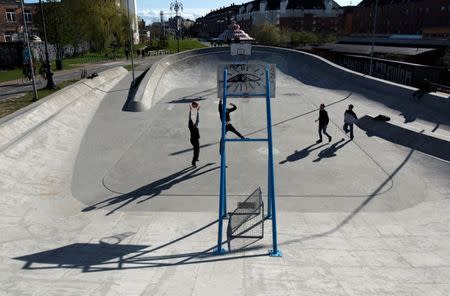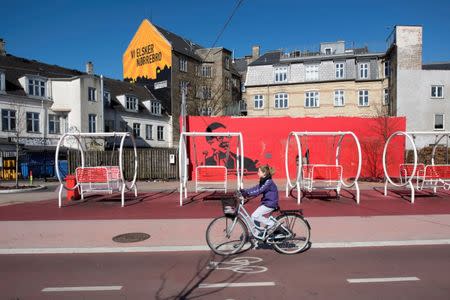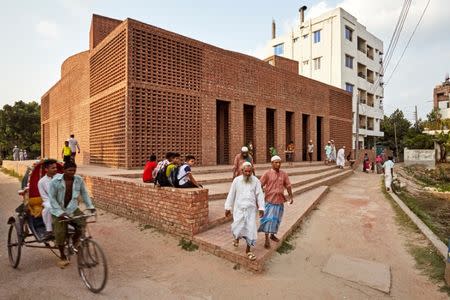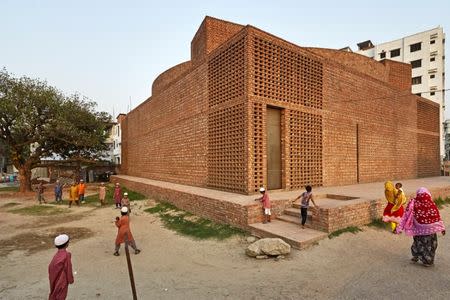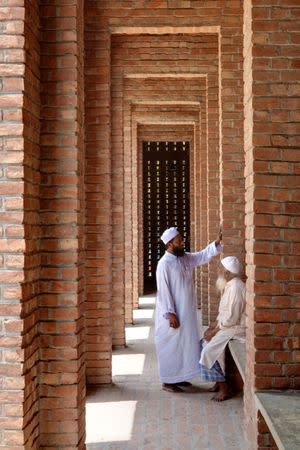Danish park designed to promote tolerance in community wins architectural award
By Noah Browning AL AIN, United Arab Emirates (Reuters) - An urban park in Denmark to promote tolerance between immigrants and local residents and a mosque in a flood-prone area of Bangladesh were among winners of the Aga Khan Award for Architecture on Monday. The $1 million prize is awarded every three years to honour architectural projects that address the needs of societies in which Muslims have a significant presence. This year's six winners also included a children's library in Beijing and a pedestrian bridge in Tehran. Superkilen, a series of public spaces in a deprived immigrant area of the Danish capital Copenhagen, was designed as an outdoor meeting place for people of 60 nationalities living in the area - including many refugees. Islamic-themed sculptures and skateboard ramps are a feature of the urban park and Muslim women bring their children there to play on the swings. "Architecture can be a means of joining people. It is a way to showcase commonalities between the Muslim communities that exist in all regions of the world," said Mohammed Al Asad, a member of the Award's steering committee. "Of course there are tensions in Europe between the immigrant and host populations. This project is unique because it brings together all the different ... communities," he said. The six winners were chosen from 348 projects in 69 countries nominated for the award, and were announced in a ceremony in the renovated 19th century Jahili fort in the United Arab Emirates. The winners were chosen by an independent jury of architectural experts appointed by the Aga Khan Foundation, named after the wealthy leader of the Ismaili branch of Shi'ite Islam. The award money will be split between the architecture firms and clients involved in the winning projects and will partly go toward outreach activities to spread design and building knowledge. The mosque in a poor and flood-prone area of Bangladesh won recognition for pushing the boundaries of what a traditional religious space should look like, Award Director Farrokh Derakhshani said. Local children are encouraged to play on the building's bare modernist space, unusual for a mosque, as shifting sunlight splashes patterns onto the dark interior floor. The 2016 Aga Khan Award for Architecture winners: BANGLADESH * Bait Ur Rouf Mosque, Dhaka (Architect: Marina Tabassum)Arefuge for spirituality in urban Dhaka, selected for itsbeautiful use of natural light. * Friendship Centre, Gaibandha (Architect: Kashef Chowdhury/ URBANA)A community centre which makes a virtue of an areasusceptible to flooding in rural Bangladesh.CHINA * Hutong Children's Library and Art Centre, Beijing(Architect: ZAO / standardarchitecture / Zhang Ke)A children'slibrary selected for its embodiment of contemporary life in thetraditional courtyard residences of Beijing's Hutongs.DENMARK * Superkilen, Copenhagen (Architects: BIG – Bjarke IngelsGroup, Topotek 1 and Superflex)A public space promotingintegration across lines of ethnicity, religion and culture.IRAN * Tabiat Pedestrian Bridge, Tehran (Architect: Diba TensileArchitecture / Leila Araghian, Alireza Behzadi)A multi-levelbridge spanning a busy motorway has created a dynamic new urbanspace.LEBANON * Issam Fares Institute, Beirut (Architect: Zaha HadidArchitects)A new building for the American University ofBeirut's campus, radical in composition but respectful of itstraditional context. (Editing by William Maclean and Susan Fenton)

 Yahoo News
Yahoo News 